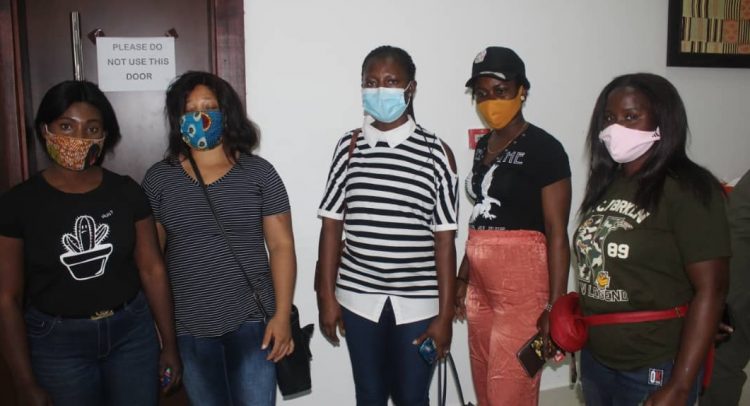The returnees from Lebanon.
The government of Ghana has brought back home 2,262 Ghanaians from Lebanon as part of efforts to evacuate its stranded citizens from the Middle East.
The returnees, majority of whom are females once working as domestic servants in Lebanese households, arrived in the country in various batches from June 19 to September 18, after suffering various forms of abuse from their bosses.
They consisted of persons with various illnesses, including nine mentally ill persons, more than 80% of them had part or all of their cumulated salaries not paid, and about 70% had their passports confiscated by their employers and Lebanese agents.
Deputy Minister of Foreign Affairs and Regional Integration, Charles Wiredu, addressing the press on the rescue mission, said a total of $1,062,600, out of which the government contributed $634,150 while Assin Central Member of Parliament (MP) Kennedy Agyepong and friends also contributed $428,450, was used for the exercise.
“Considering that majority of the girls were not paid any salaries, Travel Certificates (TCs) were issued free of charge instead of the usual $35 fee,” he said.
Mr Owiredu stated that the government also covered the cost of the Covid-19 testing and 14-day quarantine for the returnees as well as provided psychological support as they reintegrate into society.
Ghana’s Ambassador to Egypt with a concurrent accreditation to Lebanon, Sudan and Palestine, Dr. Winfred Nii Okai Hammond, noted that the Ghana Mission in Cairo, entered into dialogue through its Consulate in Beirut to obtain the release of suffering Ghanaian women from their masters and mistresses.
He said the Mission relocated its staff to Lebanon to help provide shelter, food, hospital and medical supplies, local transportation, and occasionally limited clothing for those who were thrown out from their contract homes without their salaries and personal effects.
He noted that so far, almost all the stranded Ghanaian domestic workers have been evacuated from Lebanon with the exception of 16 other persons who showed up after the process for evacuation had completed.
Dr. Hammond observed that there were about four men among the Ghanaians evacuated adding that majority of those who fall victim to agents who promise them greener pastures in the Middle East are females.
He added that because of the government’s policy in 2017 that such intended domestic migrant workers should not be allowed to travel to Gulf States and the Middle East countries, some of them paid their way through at the Kotoka International Airport, whilst many of them were smuggled through neighboring countries to fly out to their destination.
“The advent of the Covid-19 pandemic further aggravated the precarious situation of the domestic workers as their employers are unable to pay them their salaries, yet they dared not talk about their cumulated salaries but rather forced to work under very inhumane conditions,” he said.
Dr. Hammond added that most domestic workers who registered to return home were being held hostage under the pretext they have not served the full term of their contracts to compensate for the money they claimed they paid to agents.
“Not only did these domestic workers not receive their outstanding salaries, they are being held until they could reimburse the US$2000 – $3000 to their employers who literally bought them at these prices from their agents.”
Under these conditions many escaped and ended up in the streets. Sadly their exploiters reported them to the police, falsely accusing them of offences they did not commit. Consequently they were declared illegal in the country, some imprisoned for no crime committed. It took a very tough battle for the Honorary Consul General to succeed in getting their release for deportation,” he added.
He therefore cautioned Ghanaians especially females not to be carried away by the juicy promises of higher income in the Middle East adding that the region has in recent times been hard hit by the Covid-19 pandemic and other disasters.
By Jamila Akweley Okertchiri


